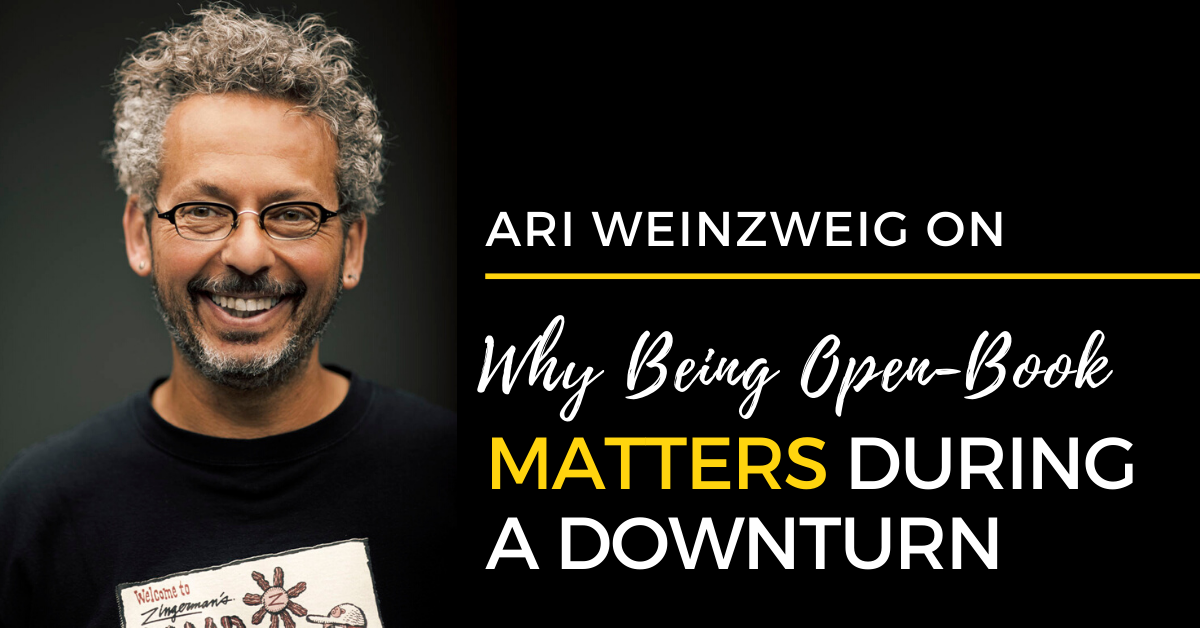
A conversion with Ari Weinzweig from Zingerman’s Community of Businesses.
The pandemic has hit restaurants hard across the country. Even those that have remained open by offering delivery and take-out service have seen sales—as well as profits—drop, often by a lot.
There’s also the question of how to manage furloughed or laid off staff—and when to bring them back to work.
Finding answers to those questions remains top of mind for Ari Weinzweig, the co-founder (with Paul Saginaw) of Zingerman’s Community of Businesses (ZCoB), a collection of what is now 11 ventures based in Ann Arbor, Michigan. ZCoB includes an array of industries such as a deli, a bakery, a mail-order fulfillment house, a caterer, a training business (that teaches open-book management among other topics), a coffee company, a creamery, a restaurant, a candy maker, an event space, and most recently, a Korean restaurant.
ZCob also includes a separate business called Zingerman’s Service Network that provides administrative services to its sister companies.
I happened to catch Ari’s online interview with Loren Feldman of 21 Hats where he and his fellow guest, Ami Kassar, talked about how their businesses are dealing with the new economic reality caused by the coronavirus.
At one point in their discussion, Loren asked Ari if being open book with the company’s financials had been helping Zingerman’s cope with the challenges they're facing today.
Ari replied: “What is the point of hiding it from them? If you do, they make up stories anyway… open book changes everyone’s perspective on how things are handled. It helps everyone make decisions and voice opinions as leaders and informed people. I don’t have to figure things out. The whole company needs to figure them out.”
Watching Ari, who has also authored multiple books, reminded me of the Q&A he and I did together back in 2009, in the wake of the last recession. When I pulled up that draft, I was struck at how his answers remain relevant today. So, in that spirit, Ari has given me permission to run that Q&A today since opening your books matters now more than ever.
Q&A With Ari Weinzweig Of Zingerman’s
While many business owners remain skeptical about the benefits of embracing open-book management, Ari Weinzweig likes to tell people he can’t imagine not running an open-book company—especially these days. The reason? “Because it’s hard enough to lead and work effectively under any circumstances,” said Weinzweig. “When the world is filled with people who think the sky is falling, there tends to be a lot of misinformation around. With open book, everyone in our company has access to the information to make decisions based on numbers, not speculation,” he said.
Weinzweig happens to be one of the first converts to the concept of open-book management, a set of guidelines that were first popularized in 1992 following the publication of Jack Stack’s The Great Game of Business® that involve teaching employees how to interpret and act on a company’s financial health.
This notion of opening the company books leads to plenty of disconnects with business owners, though, many of whom figure that their employees don’t need to know what’s on the company’s balance sheet or cash flow statement.
For Weinzweig, the opposite was true. Literally after finishing Stack’s book, Weinzweig pushed Zingerman’s to open up the company’s financial documents to its employees and to train them to both understand the numbers and to feel empowered to make the kinds of decisions that could improve them.
In fact, many employees continue to come up to Weinzweig and tell him that if not for their open-book culture, several of the businesses might not have survived the recession.
I spoke with Weinzweig about what he likes best about practicing open-book management, what some of the biggest challenges are and about why he thinks just about every business out there should open their books too.
Q: What does open-book management mean to you?
My experience is that most people think open book simply means sharing financial statements with your staff. That’s true of any publicly-traded company. But it’s more than that—it’s a participative sport not a spectator one. It’s a different approach than the standard operation in the world of finance. It’s an active system where everybody in the organization is playing a role.
Q: But it sounds like such a crazy idea to many business owners. What exactly are you trying to accomplish?
We’re trying to run the business better. Normally, you have employees out there working who don’t know what’s going on. They're making decisions about servicing customers or whether or not to throw something out, but they're making their decisions based on inaccurate information.
Most employees have a standard misconception in their minds like, "The higher sales are, the more money the company is making." Or, "Profits are based on how much cash is on hand or all the profits go directly to the owner." All of these thoughts are untrue. But, once people know what’s going on, they care more and make better decisions because you engage their intelligence and creativity.
Q: When did you first decide to open the books?
Right after I read The Great Game of Business. I remember talking to Paul (Zingerman's co-founder) and telling him this was something that already aligned with our values. We already had things like profit sharing in place. We wanted as many people involved in running the business as possible and this was a system that allowed us to do it.
Q: How big was the company at the time?
We had the deli and the bake house and we had just started Zingtrain. All told we had about 150 employees at the time.
Q: Did you bring in any outside help to get things started?
No, we did it on our own, though we did start sending people to the Gathering of Games™ which was held in Springfield, MO at the time. From the beginning, we were always good at teaching classes on how to work at the deli or the bake house. So it was almost a natural fit for us to start teaching everyone how to read financials.
Q: Were there any initial stumbling blocks?
Well, in hindsight, I regret being talked out of doing the daily Huddles, the part of playing Great GameTM where everyone in the company gathers to discuss the numbers.
People said we already had too many meetings and we could just do this on a spreadsheet so people could read it when they wanted. But we learned quickly without Huddles, the system doesn’t work. Without the constant engagement and sharing information, you lose the discipline because people stop participating.
Q: So what happened?
I would say there are three parts to playing Great GameTM : teaching, sharing, and Huddling. We did the first two very well from the beginning but did the third part poorly for about five to six years. Then, we started using Huddles again in each of the companies and it helped a lot. But, like everything else, some departments and businesses do it better than others.
Q: Tell me more about what’s involved in the “Huddles.”
Huddles are meetings built around sharing the numbers. Employees of all levels gather in a room to share their stories and then forecast their numbers for the upcoming weeks.
We use a big board to track each line item of the business and who's responsible for each line item. In some businesses, like our mail order catalog around the holidays, they might even have daily "mini-Huddles" to keep up with everything. People share their plans and ask for help. Decisions are then made based upon those plans. I would even go so far as to say the Huddle is where you actually run the business.
Q: So is everyone expected to come prepared to share information?
Well, it’s part of everyone’s job to be ready to do that. But it doesn’t happen perfectly every time.
Q: Were you ever tempted to stop playing Great GameTM ?
No, we never considered that.
Q: What are some of the biggest challenges in playing Great GameTM ?
Playing the game is...well it's hard. But being exceptional at anything will always be difficult. If people are opposed to playing Great GameTM or if they don’t believe in it—it won’t work. It’s a system and a skill no different than learning a sport or a musical instrument. If you start doing it but you don’t follow it through, it won’t work.
Q: Do you ever have employees who don’t want to learn how to read the financial statements?
In our business, if someone doesn’t want to learn, they won’t last long. Everyone needs to learn the menu, the service, the finances, everything if they want to be engaged in the business. We do get some push back about the financials, but those people seem to weed themselves out quickly.
Q: How did your employees react to playing Great GameTM during a recession?
That topic has come up a lot over the past year. Everywhere I went people were talking about the economy. The stock market is sort of unreal and based on people’s fears, thoughts, forecasts, and beliefs. The whole country is struggling to not panic.
But we didn’t have that problem. We had no panic, even in the parts of the organization where the numbers weren’t great. It’s like we were down a touchdown at the start of the fourth quarter and we knew what we needed to do to make up the deficit. That meant we didn’t have to cope with the fear of the unknown unlike most everyone else out there.
Q: Can you give me an example of what you did?
Well, in a few of our businesses, we had difficult financial settings. Sales were way down. But it was up to the employees to decide how to deal with the problem. They worked together to reduce hours, take short-term pay-cuts or defer their bonuses. They still needed leadership and guidance, but it wasn’t like they got a decision dumped on them. They were actively participating in designing the solutions. One of those businesses ended up making more money than they did the year before even though sales were down.
Q: What is the hardest question people ask you about open-book management?
There are no tough questions. Asking the question is the easy part - but not everyone wants to hear the answer.
Q: Why do you think so many companies resist opening their books?
I think the main reason is that it’s more work in the short term. It’s like going to the gym. Lots of people try it but they don’t stick with it long enough. Or, it’s like the triangle offense in the NBA. Something like 8 out of the last 11 champions have used the system, so why doesn’t every team use it? I think people don’t try to understand it, so they don’t use it. It’s easier to go on doing things the way you always did. To make it work requires a high level of commitment and participation from leadership. You can’t just turn it over to someone else. But, if you do it, you’ll find yourself infinitely healthier and more productive.
Special thanks to Ari and the team at Zingerman's Community of Businesses for continuing to support and teach the principles and practices of open-book management and The Great Game of Business®.
Go Through the 10-Steps of Great Game Implementation at Your Own Pace.
The On-Demand Get in The Game Workshop™ was developed to give participants an in-depth view of open-book management and how they can effectively play Great Game™ in their organizations.
More articles you might like:
.png)









.png)




-5.png)
.png)
